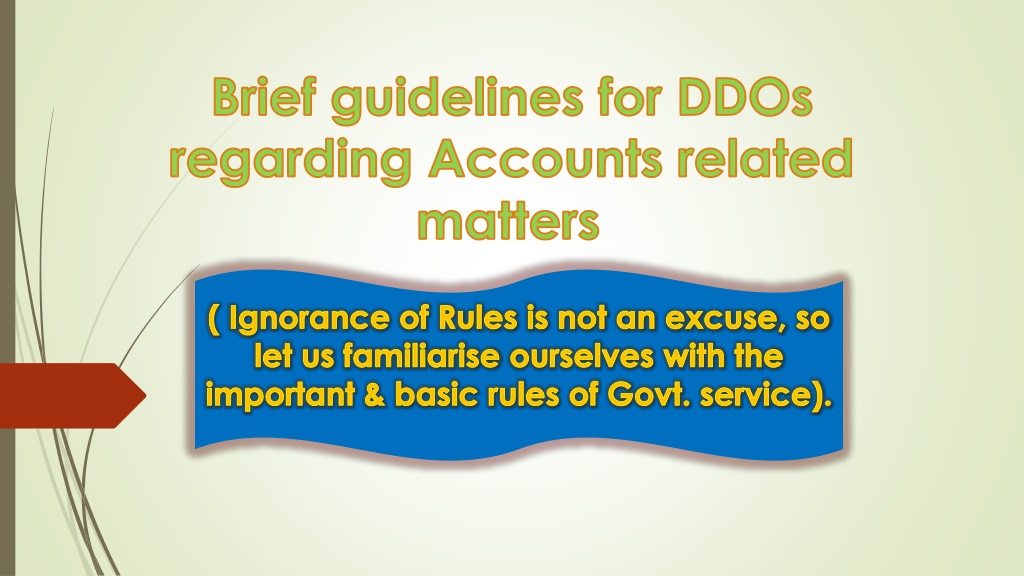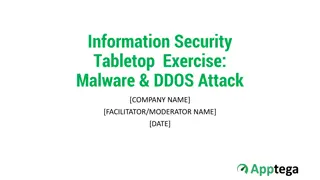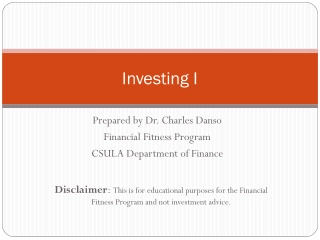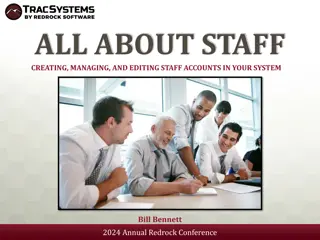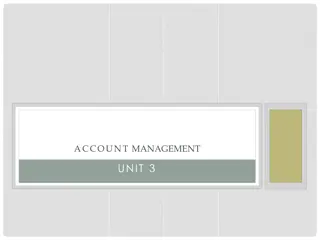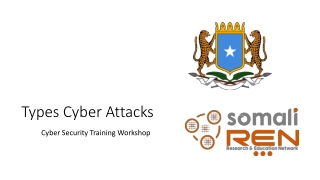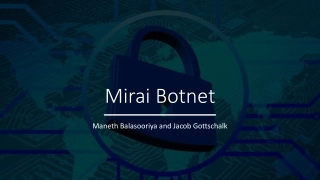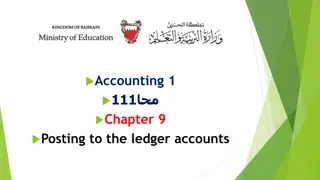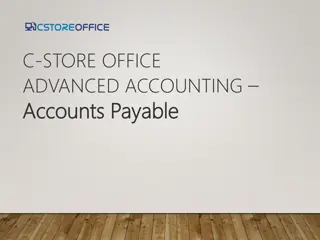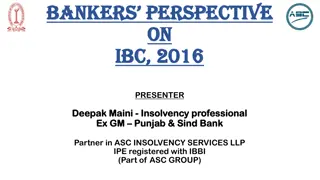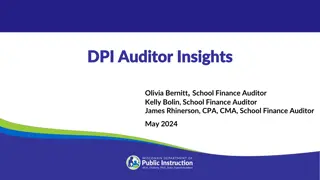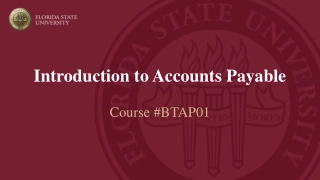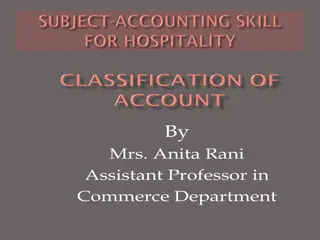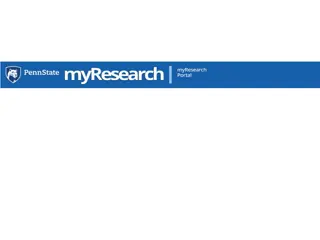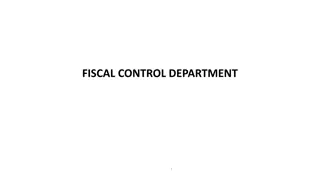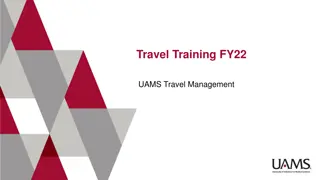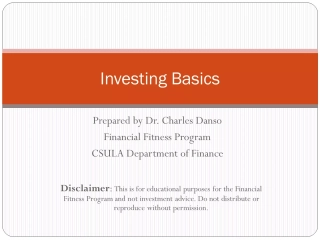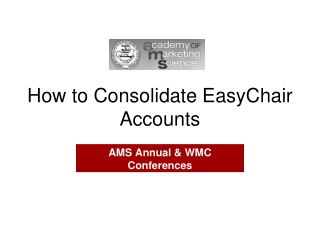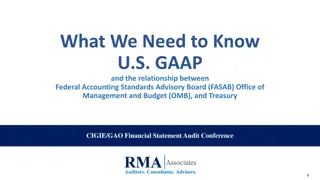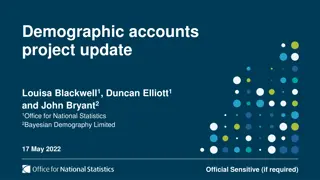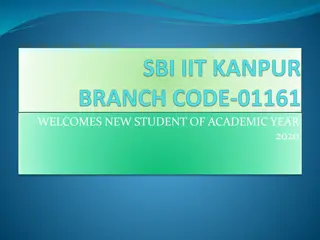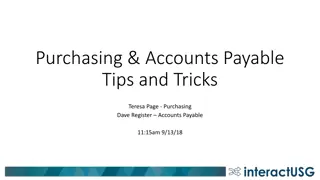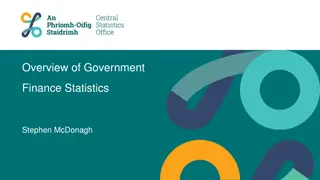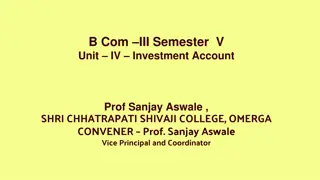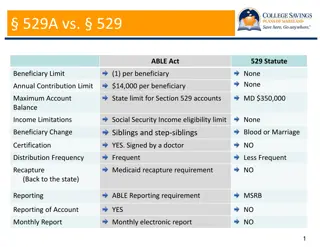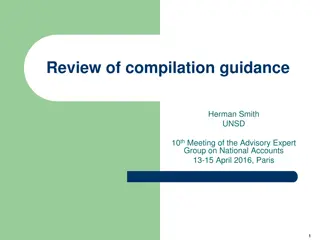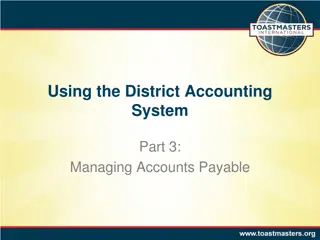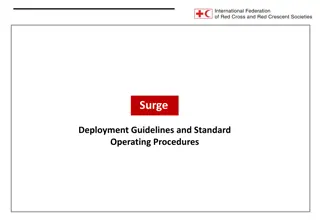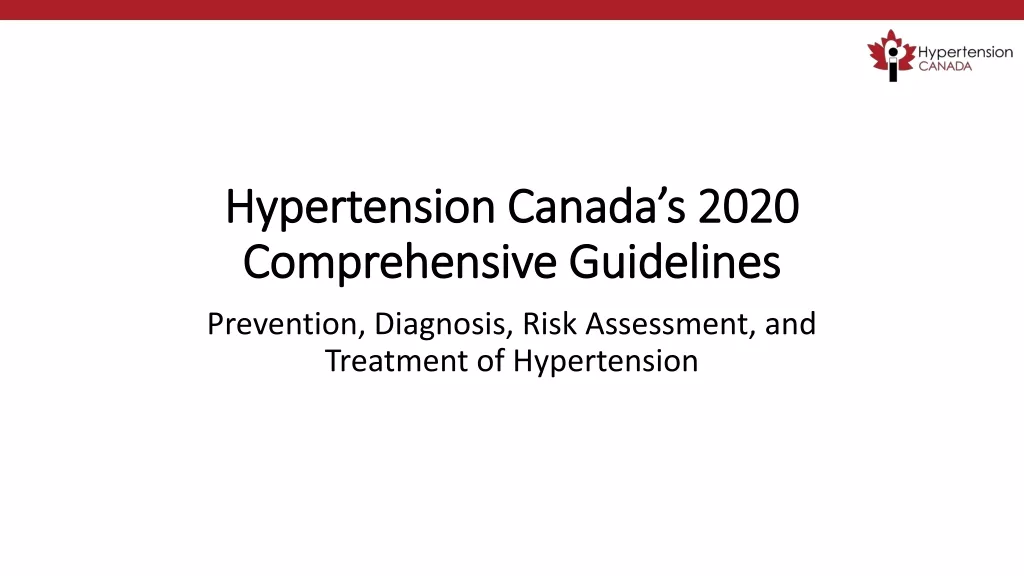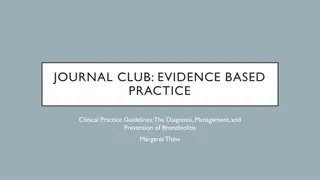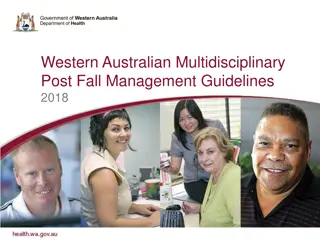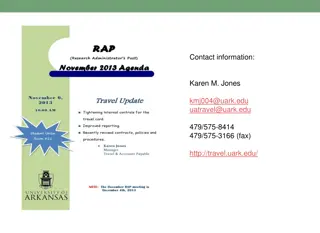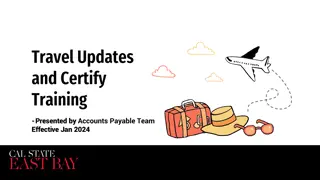Guidelines for DDOs on Accounts Management
DDOs must be well-versed in financial rules to ensure proper use of public funds. Responsibilities include proper bill preparation, expenditure monitoring, maintenance of employee service records, and accurate cash and account management. Ignorance of rules does not excuse errors in financial matters.
Download Presentation

Please find below an Image/Link to download the presentation.
The content on the website is provided AS IS for your information and personal use only. It may not be sold, licensed, or shared on other websites without obtaining consent from the author. Download presentation by click this link. If you encounter any issues during the download, it is possible that the publisher has removed the file from their server.
E N D
Presentation Transcript
Brief guidelines for DDOs regarding Accounts related matters ( Ignorance of Rules is not an excuse, so let us familiarise ourselves with the important & basic rules of Govt. service).
In the J&K Financial Code Volume 1,it is stated that : The fact that a Government servant has been misled or deceived by a subordinate, will in no way mitigate his (DDOs) personal responsibility, since every Government servant should be familiar with the financial rules laid down by the Government and exercise a specially strict and close control over his subordinates in regard to the use of public funds and the maintenance accounts . of proper
Preparation of Bills & Monitoring of Expenditure A DDO must give a complete and correct classification on the bills upto the lowest detailed head. He/she should maintain upto date record of expenditure so as to keep expenditure within the authorised budgetary allocation. He/she should ,at the close of each month, reconcile accounts of expenditure against budget with the Treasury records. A consolidated statement of expenditure against the budget allocation in respect of every head of account should be drawn at the close of every month for submission to the controlling officer.
2. Maintenance of service records of the employees working under him/her The main points to remember in this regard are: Record of D.O.B. on the first page of the service book/other kind of service record as per the prescribed procedure. Making entries regarding all the important events in the official life of a govt servant. Safe custody of service books. At the beginning of each year, all the service books should be taken up for verification of service and a certificate of verification of service recorded therein.
3. Cash & Accounts All monetary transactions should be entered in the cash book in the prescribed form as soon as they occur and duly attested. The cash book should be closed regularly and completely checked, and at the end of each month the cash balance verified physically. For all moneys received, receipts in the prescribed form should be issued and it should be ensured that such receipts have duly been entered in the cash book.
Except where otherwise specifically provided, any loss or shortage of public money, stamps, stores or other properties caused by defalcation or otherwise should be immediately reported to the next higher authority. No expenditure should be incurred without the sanction of the competent authority. All charges actually incurred must be drawn and paid at once and under no circumstances be allowed to stand over to be paid from the next year s grant.
No money should be drawn in anticipation of demand or to prevent lapse of budget grant. Expenditure relating to two or more major heads should not be included in one bill and full account classification must be recorded on each bill. Expenditure control register should be maintained to exercise an effective check over expenditure against the budget allotment . Bills for pay, leave salary and allowances should be prepared separately for :- (i) Establishments whose charges are debitable to different heads of Accounts, (ii)Personnel to whom salary is payable individually by cheque, and (iii)Class iv Employees.
4. Finalisation of Pension Cases The Heads of Offices should see that pension cases are finalised expeditiously and there should be no delay in the payment of pensions DCRG and commuted value of pension. The pension papers duly completed after determining the qualifying service, the average emoluments and the admissible pension and gratuity should be sent to the PAO not later than six months before the date of retirement of Government servant. In order to ensure timely finalisation of pension case, suitable action should be taken to ascertain Government dues time and to adjust them in accordance with the prescribed procedures. well in
5. GPF/NPS/SLI All permanent employees and the temporary employees in continuous service of more than one year should be assigned GPF Account Nos. A pass book should be issued to each subscriber in the prescribed format. Final payment of GPF moneys should be made, after the accounts have been thoroughly checked. In case of Govt. servants appointed on or after 01.01.2010, PRAN must be allocated instead of GP Fund A/c no. From the gross salary of such employees, 10% of BP+DA must be deducted in the pay bill itself and a separate bill must be prepared for crediting 10% of employer s (Govt.) share into the PRAN of such employees. Each & every govt. servant also has to get an SLI number. Each account should be reconciled periodically preferably after closing of financial Year.
6. Advances to Government Servants The Head of Office should ensure that the conditions attached to the grant of advances are fulfilled and that proper accounts are maintained. Recoveries of advances and of interest wherever recoverable should be effected in time and delayed on no account. Every payment of advance should be entered in the pay bill register, and the recoveries effected alongwith the interest, if any, should be noted in that register.
7.Last Pay Certificate (LPC) When an official is transferred to another post, he shall be issued an LPC which shall contain details regarding the last BP & other allowances drawn by him/her, deductions made from his salary like GPF,SLI,etc and other details. When last pay certificate of an officer transferred/appointed to a new post is not available, the concerned Government servant in such circumstances be allowed to draw pay and allowances provisionally up to a period of three months provided he gives an undertaking that in the event of any excess drawal or outstanding recovery which may come to the notice of the Department after the receipt of last pay certificate, the same shall be refunded by him/her. Various account no. like PRAN, PAN, Bank, GPF, SLI etc. should also be clearly indicated on LPC s
8. Stores While making purchase of stores ,following important points should be kept in mind: a) Expenditure on stores is expenditure except in case of works expenditure, etc. b) Normally, purchase of stores should be made through tendering/e-tendering/GEM portal. c) It should be ensured that all the conditions mentioned in the Financial code Vol I are duly fulfilled. Depending on the total single/limited/open tendering may be resorted to. included under contingent value of the tender,
Purchase orders should not be split up to avoid the necessity of obtaining the sanction of higher authority. All materials received shall be examined, counted ,measured or weighed as the case may be, when delivery is taken and they should be taken in charge by a responsible Government Officer. A physical verification of all stores should be made at least once every year. Previous sanction of the Controlling authority should be obtained to the write off of all losses, deficiencies or depreciation in the value of stores.
9. LEAVES This is a very important aspect of an employee's official service. Although ordinarily a DDO may not disallow grant of a leave,an employee can't claim it as a matter of right. A DDO must be aware of the conditions governing grant of various kinds of leave including the authority competent to grant the leave, the duration for which it can be granted,etc. A DDO must invariably maintain the leave account of each and every employee working under him/her and also enter the same in his/her service book/record.
Various kinds of leave/s due to an employee include: Earned Leave; o Maximum 300 days ;120 days at a time; earned @ 15 days on 1st Jan & 1st July of each year i.e. a total of 30 days per year. Half pay leave; oMaximum 360 days during entire service; 90 days at a time. It is commutable to full pay leave equal to half the no. of days of HPL availed; Earned @ 20 days every completed year of service. It may be granted on medical grounds or for private affairs.
Maternity leave: oMaximum 180 days for at a time; granted for two surviving children. Abortion Leave: oMaximum 6 weeks for each instance of abortion, irrespective of number of surviving children. Paternity leave: o A male Government servant (including an apprentice) with less than two surviving children may be granted paternity leave for a period of 15 days during the confinement of his wife
Child care leave: o730 days during whole service for taking care of her two eldest children upto the age of 18 years or in case of handicapped child/children upto 22 years (SRO 232; dtd: 22.7.15) ; not more than three spells in a year Leave not due: oThis is a kind of advance leave during which an employee is paid half of his/her salary. oThis leave shall be limited to the no. of days of HPL that an employee is likely to earn during the remaining years of his/her service and shall be debited against his/her HPL account.
Extra-ordinary leave or leave without pay: o This leave is granted to a GS when no other leave is due to him/her. oA Government servant on extraordinary leave is not entitled to any leave salary. Study leave: oMaximum 01 year at a time and 24 months during entire service oDuring study leave,a govt servant may be granted basic pay+DA & study allowance wherever due. o The competent auth. for grant of such leave shall be admin dept for studies within state, GAD for studies outside state but within India & Govt for studies outside India. (SRO 274 dtd: 30.5.13)
Some other kinds of leave include quarantine leave, special disability leave, special casual leave,etc. Casual leave: oMaximum 15 days in a year and 10 days in one continuous spell or 12 days when holiday/s fall during the casual leave.
Maximum amount of continuous leave: Maximum amount of continuous leave that may be granted to a GS is 05 years unless determined otherwise by the Govt for special reasons. LEAVE SALARY: A Government servant who proceeds on earned leave is entitled to leave salary equal to the pay drawn immediately before proceeding on earned leave. A Government servant on "half pay leave" or "leave not due" is entitled to leave salary equal to half the amount specified above. A Government servant on commuted leave is entitled to leave salary equal to full pay. A Government servant on extraordinary leave is not entitled to any leave salary.
Delegation of powers to Officers of Education Dept. Administrative Gazetted Officers. Director,School Education in case of non-gazetted staff. Dept. in case of To prevent an officer from availing himself of the vacation or vacations ( also called detention). Article 151 of J&K CSR To grant all kinds of leave except leave outside India and Study Leave. Concerned drawing and disbursing officers/Heads of High/Higher Secondary Schools/Teachers Training Institutions. Article 112-(b) of J&K CSR
CASH-IN-LIEU OF LEAVE SALARY A Government servant may be paid cash equivalent of leave salary in respect of period of earned leave at his credit at the time of retirement on superannuation subject to the following,& other, conditions: It shall be limited to a maximum of 300 days of Earned Leave. It shall be paid in one lump sum as a one time settlement. It is calculated in terms of BP & DA only. Important: it is the duty of DDO to follow the case of cash-in- lieu of Leave salary for a superannuating employee and not the official. Hence, non-representation of a case from an employee under any reason is not an excuse.
Conditions specific to vacational employees of Edu. Dept. for grant of Cash-in-lieu of Leave Salary Detentions during winter vacation can only be authorised by the then Director,School Education. Period of working as DRG/ZRP/CRP,supported by orders of competent authorities and duly entered in service book. Orders of depolyment as trainers/trainees during vacations on non-remuneration basis,duly entered countersigned by competent authority. Strict compliance to Circular No: 1760-Acctts of 2019; Dated: 12/02/2019 while submitting Leave case. in service book &
Medical Re-Imbursement Cases These should be processed in terms J&K Allowance)Rules ,1990 as amended from time to time. Important points to remember in this regard are: MRC Claims for an official or his dependent are entertained only for two types of claims: If the claim pertains to a period of Hospitalization. If the claim pertains to a Life Consuming Disease Submission of Form 1, Form 2, original vouchers concerned, abstract of vouchers, applicable)/hospitalization record, dependent certificate from competent authority (if applicable),etc. In case of treatment outside state or within state but not in a govt. hospital, referral may also be submitted. Important Note: Diseases certified as life long must in no case be treated same as a life consuming one. Civil Services (Medical Attendance & (duly attested by DDO & HOD consuming life certificate (if
OTHER IMPORTANT SERVICE MATTERS THAT A DDO MUST KNOW ABOUT 1. Voluntary Retirement (Article 230) Can be availed after a GS gives three months notice subject to condition that official has completed 20 Years of Service/ 40 Six monthly periods of service, or 45 yrs of age 2. Pay Anomaly (Step Up). Article 77-B Various Certificates by the DDO Attested Fixation Sheets, Comparative statement, Xerox copy of entire service Book Routed through Proper Channel
3. Dies Non. It acts as a bridge b/w two periods of services. It does not qualify for remuneration, pension, increments etc. 4. Functional Promotion. 5. Time Bound Promotion/In-situ promotion 9,18, & 27 years Checks to be exercised: Service verifications, Leave Verifications and certificates. 6. Technical Resignation An official who resigns may not be allowed to join in any other office unless the resignation of the official has been accepted
